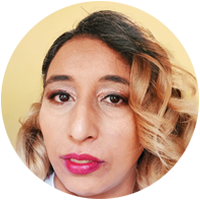Ons Kaabia | Master of Medical Sciences in Clinical Investigation

Ons Kaabia was working as an associate professor at the Faculty of Medicine of Sousse in Tunisia when she received an email from a fellow professor about a virtual information session for a postgraduate education program at Harvard Medical School. Kaabia was interested in furthering her research career, so she attended the meeting, where she first met Dr. Finnian R. McCausland, co-director of the Harvard Medical School (HMS) Master of Medical Sciences in Clinical Investigation program. With her background in comparative studies, she saw this program as an opportunity to gain experience in clinical trials and continue her research at HMS.
HMS had arranged for Kaabia to meet with her mentor, Rania Kheder El Fekih, a fellow Tunisian student, at Logan Airport. Rania helped Kaabia find where she was living, get around the city, and adjust to life in an unfamiliar country. Having El Fekih’s help made Kaabia feel much less homesick, and it was easier to adapt to having the help of someone who had already gone through the same process.
Additionally, Kaabia applauds Harvard for its accessible resources, such as shuttles to help her safely navigate the city and free access to museums. Immersing herself in Boston’s culture and history has given Kaabia a greater sense of belonging.
Being a part of the HMS community and living on campus was important to her. “I really wanted to be part of a community and have this feeling of belonging.” Through the shared facilities and kitchen space, she has met HMS students from the same program and other areas. Collaborating outside the classroom on research and other projects has enabled Kaabia to see different perspectives and exchange new ideas.
With a background in obstetrics and gynecology, particularly oncological gynecology, Kaabia was particularly drawn to the Clinical Trials pathway within the Clinical Investigation track. Back in Tunisia, clinical trials are funded differently, so this pathway offers access to a new opportunity. In the first two semesters, Kaabia has already started working toward her thesis project, including finding the perfect mentor. This project will be the focus of her two years in the program. She looks forward to diving deeper into the first phase (observational studies) and moving into phase two (educational trials).
Kaabia is fully committed to the program and to creating new opportunities through her studies. “I’m excited about doing research in Boston and at Harvard Medical School. I know that once I have my master’s degree, the sky’s the limit for where I go next.”